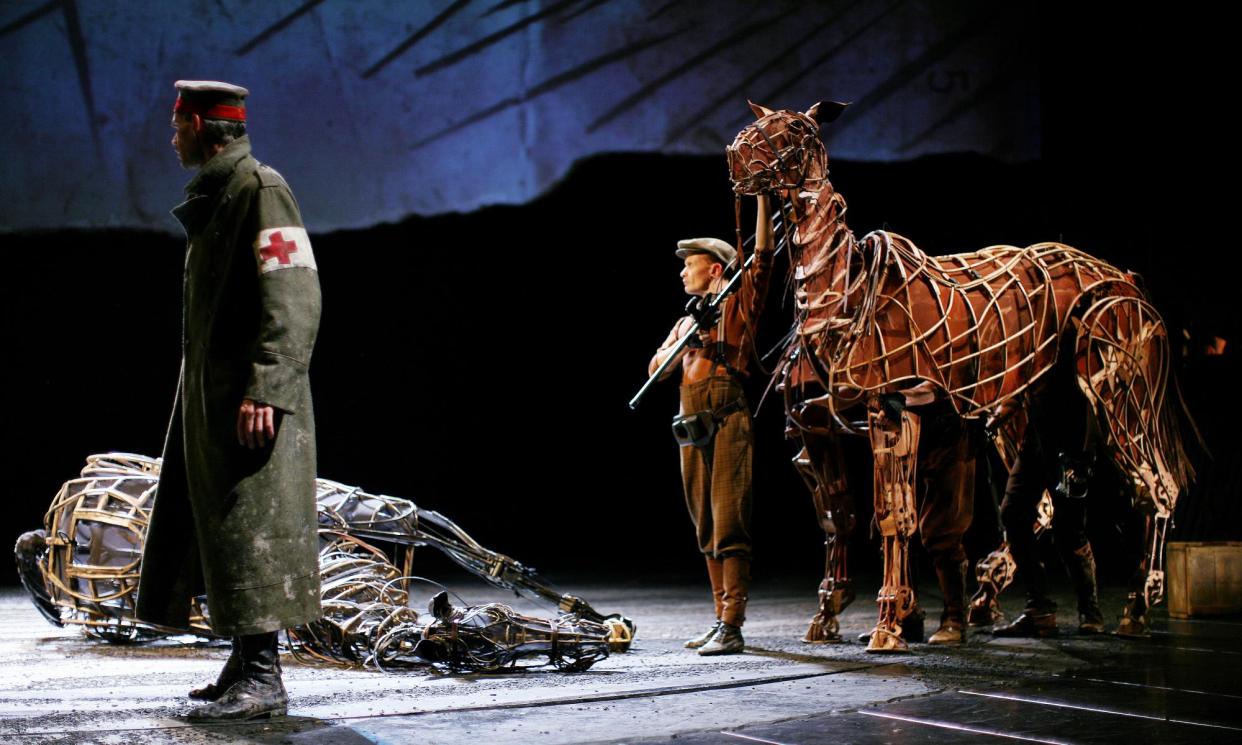National Theatre’s War Horse to return to UK stages after five-year absence

The global theatrical phenomenon War Horse is returning to British stages for the first time in five years, and its director hopes audiences will gain new perspectives against the backdrop of the Ukraine and Gaza conflicts.
The National Theatre and Tom Morris are embarking on a nationwide UK tour from this September of their adaptation of Michael Morpurgo’s story about a boy and his horse who experience the horrors of the first world war.
The launch will mark a revival for War Horse after the Covid pandemic abruptly shut down a production in Australia in 2020.
“The world has changed in all kinds of ways since we first made the show,” said Morris, who directed the original production in 2007. “It was a crazy experimental show which all of us who worked on it got very excited by, but I don’t think anyone anticipated how many invitations it would get to play in so many different countries when we first made it.”
War Horse has played in 14 countries and been seen by more than 8 million people worldwide. Its revival comes more than 40 years since Morpurgo’s novel was first published and on the 110-year anniversary of the first world war.
“Now obviously the war that Michael was writing about is even further in the dim annals of history but horrifyingly there is trench warfare again in Europe,” Morris said. “The world feels increasingly unstable and I’m really fascinated to see what the story feels like for new audiences.
“I don’t think a piece of theatre can change the course of history, but if you look at what it offers within our culture and the terrifying disappearance of the opportunity to reflect from most of our lives, it feels really important.”
Morpurgo was inspired to write his novel after having fireside conversations with first world war veterans in a Devon pub. From those chats, seeds were planted that grew into a global phenomenon.
The production, featuring groundbreaking puppetry, ran for seven years and was a huge money spinner for the National Theatre, bringing in £13.5m before it ended there in 2015. It continued to find fans after the theatre run concluded, especially after it was adapted for the big screen by Steven Spielberg in 2012.
Morpugo famously hated Spielberg’s film but he is delighted that the National Theatre will be taking the production on the road again. “Joey [the horse] out in his field in deepest Devon is thrilled, I am thrilled,” he said. “War Horse is about the ‘pity of war’ and about a horse and his boy, but it’s also so many other things – it’s about family and community, courage and loss, hope and, most importantly, reconciliation, a story of then and now.”
The executive director of the National Theatre, Kate Varah, said the themes of the production were particularly powerful at the moment when wars had created instability across much of the world.
She said: “It’s still relevant – in fact, sadly, the impact of the machinery of war on animals and humans is a powerful theme in today’s world. It’s incredibly topical but there are also themes around family, community, courage, loss – and reconciliation most importantly. All of that makes it feel like an appropriate time for it to be taken out on tour around the country.”
Morris admitted that bringing back the show, which is the most successful in the history of the National Theatre, was a risk, especially when theatres outside London have struggled to entice audiences back since the Covid crisis.
“If you were just looking to preserve the reputation of the show then you’d say ‘let’s leave it’,” he said. “But certainly Michael felt that the reason to bring it back is because there’s more to discover by bringing it back. We will find new things in it, things which open up where we are now. You may think the world was unstable and precarious in 2007 but it feels a lot more so now.”
The tour will start at the New Wimbledon theatre on 5 September before touring to the Lowry in Salford, the Mayflower theatre in Southampton, the Marlowe in Canterbury, the Sunderland Empire, Theatre Royal Plymouth and New Theatre Oxford.


